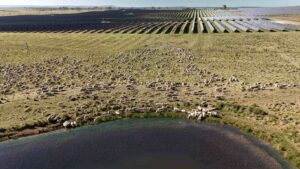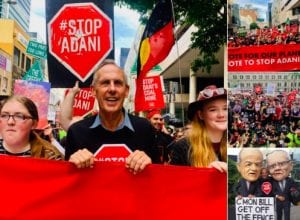
For the past few weeks in the lead up to the release of the Intergenerational Report Joe Hockey frequently stated that he would be using the document to begin a national discussion about the direction of the Australian economy. Now that the report is out – it’s vital that discussion goes well beyond the traditional view of growth in Government expenditure.
But unfortunately, by ignoring one of the most important policy areas facing government’s globally – climate change – the Intergenerational Report has fallen over the first hurdle.
It was former Liberal Treasurer Peter Costello who first introduced Intergenerational reports to provide a space to look forward and assess the sustainability of the budget and economic conditions in light of current policies over the next forty years. Simply put, these reports were created to measure how the spending and policies of this generation will affect future generations.
At first glance the 2015 Intergenerational report may appear comprehensive – but on closer inspection it fails to explore one of the largest contributors to Australia’s prosperity – the natural environment. Climate change is mentioned just 12 times – and only in passing – in the 175 page report. Indeed it makes it clear that the only government expenses that matter are the ones affected by demographic change. This is a massive oversight because the environment is the very foundation stone of Australians’ livelihoods and way of life
Australians elect governments to govern in a way that enables current and future generations to prosper. The foresight and investment of previous generations’ investment in healthcare, education and environmental protection has given Australia its current prosperity while maintaining our environmental life support systems.
It is a reasonable expectation that responsible Government should build on this environmental prosperity by establishing frameworks to ensure all Australians contribute to the ongoing prosperity of our nation in a fair and equitable manner. Responsible environmental and economic stewardship should ensure the welfare of all Australians.
However, based on the Abbott Government’s recent record it seems far less interested in responsible stewardship than in shoring up business interests. The government’s modus operandi appears to elevate businesses and their lobby groups financial interests over and above the ongoing maintenance of our environmental life support systems.
Protecting the interests of big polluters by allowing them to freely pollute is not responsible stewardship. Good governance should, as a fundamental expectation, ensure future generations are able to enjoy the same quality of life as we enjoy today. Yet this Government refuses to discharge one of the fundamental roles of Government.
Without action on climate change the frequency and intensity of droughts and bushfires will increase. Agricultural land will become less productive and there will be nationwide water shortages. Rising temperatures will also degrade Australia’s iconic tourism spots, the Great Barrier Reef and Kakadu. All of these examples will directly impact the Government’s financial bottom line.
More Government money will have to be paid out in disaster recovery and drought relief payments. Less revenue will be collected from less tourists coming to visit our shores and low income citizens will require increased government assistance to adapt to the severe weather patterns.
Prime Minister Abbott recently talked about his goal of reducing the deficit to end ‘intergenerational theft against our children and grandchildren. To put it plainly, continuing to dismiss the social and economic implications of the environmental crisis is risking the prosperity of future generations – a much more literal and measurable form of intergenerational theft.
The Government argues that the financial position of the budget is the only priority that matters for future prosperity. But most Australians recognise that the ongoing sustainability of the budget bottom line depends on Australia’s ability to transition to a clean economy alongside responsible management of Government’s finances.
Moreover, these goals should never be mutually exclusive. There are a number of initiatives that tick both of these boxes. They allow the Government to maintain long term balance sheets: financial and environmental. These include ending the uncertainty around the renewable energy target by leaving it at 20% by 2020 which will ensure investor confidence and allow renewable energy to continue to play a role in transitioning the Australian economy while creating jobs.
Moreover, fossil fuel subsidies should be restructured, saving the Budget billions of dollars every year instead of subsidising the activities of polluting industries.
Stronger environment protection laws will work to protect Australia’s natural assets that play a central role in Australia’s economic, social and cultural way of life. At present, the Government is failing to lead by ignoring the long term impacts of climate change and ongoing environmental degradation. This inaction will have far reaching economic and social consequences which will flow through to Government budgets.
If the Treasurer wants a genuinely wide ranging national discussion about the direction of the Australian economy over the next forty years he should start by acknowledging and planning for the impact of climate change on Australia’s ongoing prosperity. If the Government was serious about not passing on a burden to future generations, it wouldn’t pay big polluting companies to pollute – as it does through the diesel fuel subsidy – and would start to play a constructive role in the global effort to tackle climate change.
By virtually ignoring climate change, the greatest challenge facing policymakers globally, the 2015 Intergenerational Report has failed.
Matthew Rose is an economist for the Australian Conservation Foundation






